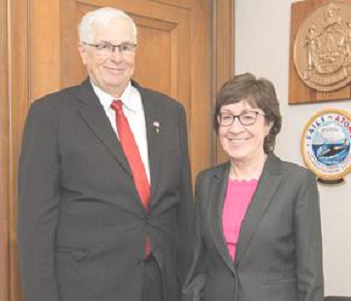CHINA: Budget draft renews conflict with fire departments
 by Mary Grow
by Mary Grow
The special China selectmen’s meeting Jan. 7, called to discuss the town conflict of interest policy and to give board members their copies of Town Manager Dennis Heath’s draft 2020-21 budget, turned out to be yet another round in the months-long argument between town officials and the volunteer fire departments.
Heath, recovering from surgery for a broken ankle, was absent, leaving board Chairman Ronald Breton the spokesman for the town side. Town Attorney Amanda Meader and Budget Committee Chairman Robert Batteese were major participants in the discussion.
At issue, still, was payment of stipends to volunteer firefighters as a contribution toward their expenses.
At issue, still, was payment of stipends to volunteer firefighters as a contribution toward their expenses. In the current year’s budget, stipends were included in the fire department and China Rescue account. Town meeting voters approved a total fire and rescue budget larger than either the selectmen or the budget committee requested, specifically to cover the amount the departments sought for stipends.
Heath questions the legality of using tax money for stipends for volunteers. Over the last year and a half, he has sought opinions from the state and federal labor departments. State officials approved a plan presented by the firefighters, Heath said in a post-meeting email; federal labor officials have not replied.
The main argument Jan. 7 was over whether members of the budget committee who are firefighters, or whose family members are firefighters, will be in conflict of interest if they vote on whether to recommend voters approve stipends.
China’s Administrative Code of Ethics bars any appointed or elected official from participating in any way in deciding on an item “in which he or she or a member of his or her immediate family has a financial or special interest, other than an interest shared by the public generally.”
Attorney Meader said the wording clearly bars a budget committee member from voting on a recommendation to fund stipends if he (or she) or an immediate family member might get one, even though the amounts involved are small and even though town meeting voters approve. The point, she said, is “to maintain public trust and public confidence.”
Breton defines the situation as volunteers in a nonprofit organization getting public money, disbursed through the fire chiefs without voters knowing who gets how much.
“Benefiting the general public,” Batteese interjected.
Breton said he believes in the proposed 2020-2021 budget firefighters’ stipends are not in the fire and rescue account, but under the community support organizations account, which in the current year includes libraries, historical buildings, some lake protection work and The Town Line newspaper. However, since the budget was not handed out until the end of the meeting, his opinion was not confirmed.
Batteese said he joined the volunteer fire department soon after moving to China in 1984. He was elected to the budget committee in 1987 and has been its chairman since 1995. The committee has made annual recommendations on the town budget, including fire department funding, and he thinks there has never been a conflict.
Breton said if Batteese disagreed with Meader and found no conflict, Breton had the power to overrule Batteese. Batteese disagreed.
Budget committee member Tom Rumpf said most committee members are also fire department members or have relatives who are.
The Jan. 7 conclusions were that there should be some way to help firefighters without using the word “stipends,” even though, Breton said, everyone would know what the money was intended for; and, at Meader’s suggestion, that discussion should be suspended until the budget accounts were available. Breton promised another meeting if needed once selectmen start budget consideration.
A related, shorter argument was over whether a member of the Four Seasons Club – Rumpf is its president – could vote on a town grant to the club. He has applied for funding from China’s Tax Increment Financing (TIF) fund for trail work and an equipment storage building.
Meader said conflict of interest applies to individuals, not to organizations. Asked if Four Seasons Club members are paid, Rumpf laughed. But, he asked, would a landowner whose land value was increased by Four Seasons Club trail improvements be considered as benefiting?
On yet another related topic, Batteese objected to Heath’s proposed budget review schedule, which called for the budget committee to make recommendations on Jan. 23 and the selectmen on Jan. 30. The budget committee, Batteese said, is supposed to review and endorse or change the selectmen’s recommended budget.
In past years, selectmen have held one or more meetings to make their recommendations, often including at least one joint meeting with the budget committee; the budget committee has made it recommendations; and selectmen have had a final meeting to approve the town business meeting warrant. If the two boards disagree, selectmen either accept the budget committee figure or put both recommendations in the warrant for voters to consider.
After an exchange of emails, on Jan. 13 Hapgood announced the following schedule: Tuesday, Jan. 21, regular selectmen’s meeting (moved from the usual Monday due to the Martin Luther King Jr. holiday); Monday, Jan. 27, special selectmen’s meeting to discuss the 2020-2021 budget; Thursday, Jan. 30, budget committee meeting; and Monday, Feb. 3, regular selectmen’s meeting. The budget committee meets at 7 p.m., the selectmen at 6:30 p.m.





